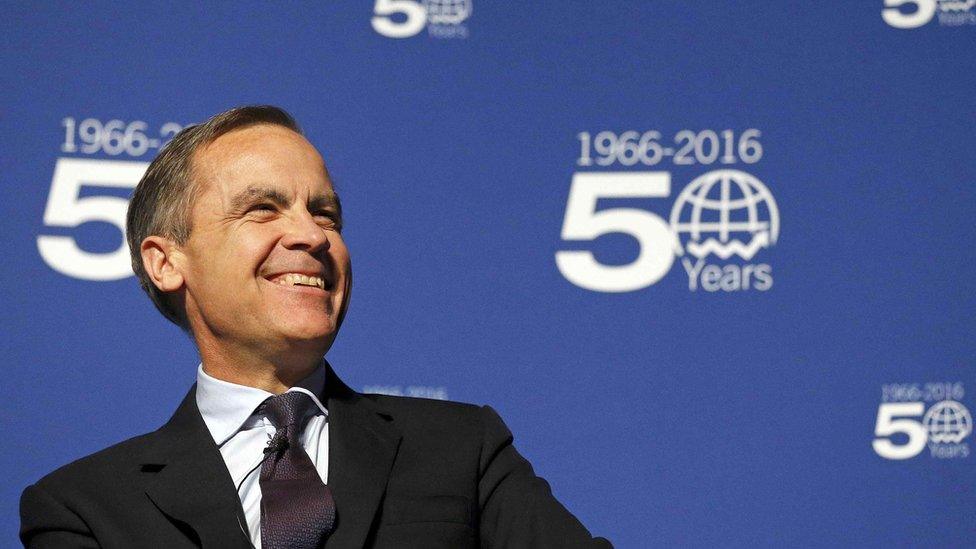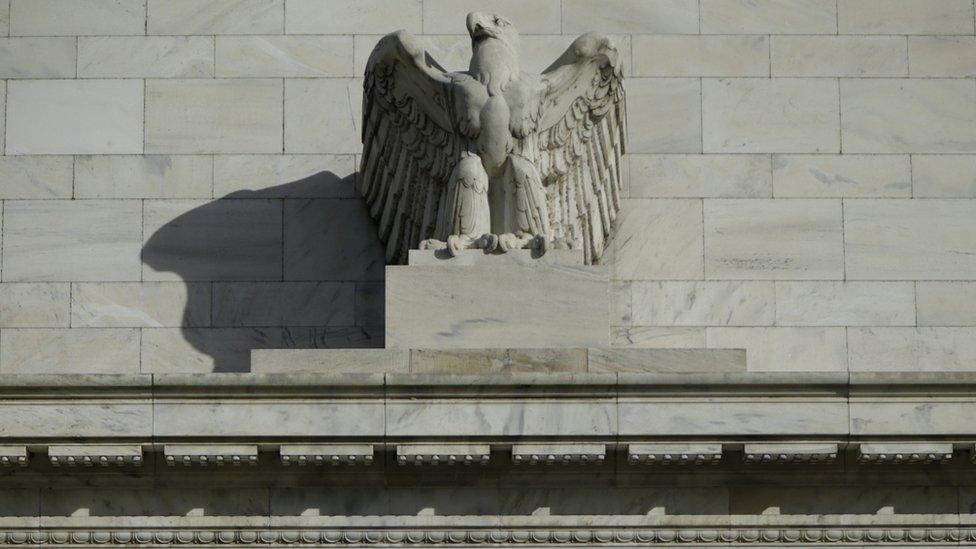Carney 'too aggressive' on interest rate rise threat
- Published
- comments
Fidelity's Dominic Rossi says central banks 'too aggressive' on rates
The governor of the Bank of England has been "too aggressive" in suggesting interest rates may rise, one of world's leading authorities on the turmoil in global markets has told the BBC.
Dominic Rossi, global chief investment officer of equities at Fidelity, the world's second largest fund manager, said Mark Carney had confused markets.
He said the Bank had been "poor" at understanding why inflation was so low.
He also said that interest rates were unlikely to rise in the near future.
Deflation, he said, was more of a risk than inflation.
His words are significant as Fidelity looks after millions of people's investments and pensions, and invests billions of pounds around the world.
Rate expectations
Mr Carney has been criticised in the past for his policy of "forward guidance", where the Bank forecasts future economic trends and suggests when interest rate rises may materialise.
The Governor suggested last summer that the issue of interest rate rises would come into "sharper relief" at the turn of the year, leading many to speculate that the first rate rise could come as early as last month.
But in a speech in January, Mr Carney said that the global economic slowdown and a lack of inflationary pressure in the UK had made a rate increase less likely.

Mr Carney has been criticised for his forward guidance policy
I asked Mr Rossi if the critics of Mr Carney's "forward guidance" were right.
"I do see where the critics are coming from," Mr Rossi said.
"I think part of that criticism is about the whole case for forward guidance given the fact we live in a world which is highly unpredictable and where external forces can derail your economic forecasts pretty quickly.
"The Bank of England's inflation forecasts have been poor and therefore the guidance towards interest rates has been too aggressive at times and I think the fact the bank is now rolling back from yet another interest rate forecast illustrates the point."
Changing forecasts
Sources at the Bank said that transparency on the institution's latest thinking about when interest rates might rise was far better than surprising the markets with a shock increase.
And that forecasts were just that - forecasts, which can change with external events such as the rapid drop in the oil price.
Mr Rossi's intervention comes ahead of the Bank's inflation report, published at midday, which will give the Bank's latest take on the strength - or otherwise - of the UK economy.
The Monetary Policy Committee, the Bank's group of economists that decide on interest rate rises, will also publish its latest thinking on the issue.
'Communication' issues
The Bank of England is not the only central bank in Mr Rossi's sights.
He said that the Federal Reserve (the US central bank), the European Central Bank and the People's Bank of China all had "communication" issues.
That's shorthand for not being clear on how their policies might affect economic growth and currency valuations.

Mr Rossi has criticised communication from the US Federal Reserve
"I think they were right to raise interest rates in December," Mr Rossi said of the Federal Reserve.
"But what surprised me, and what I think was a mistake, was how forceful they were after the interest rate [rise] in presenting their case for future rate rises throughout 2016 - up to four.
"And the market became very nervous about that forecast because when looking at inflation data in particular there's no case for such an aggressive move which is having implications for the dollar with knock on effects on currencies, commodities and further price deflation."
Volatile markets
Global market turmoil has been a major feature of the first six weeks of 2016, with volatile indices creating fear in many countries that the collapse in stock market values is signalling wider problems in the global economy.
Surely it should be pretty simple for central banks to communicate clearly about what they expect the future trends in interest rates and inflation to be?
And the policies they will use to support global growth.
"I don't think it is simple because you're trying to control the expectations of people you can't control," Mr Rossi said of how markets view the sometimes Delphic utterances of central banks.
"I think their communication error is that they have consistently understated the disinflationary forces in the world economy.
"Look at the ECB [the European Central Bank], the Bank of England, the Chinese and the Fed - they've all consistently over-egged their inflation forecasts and subsequently they've been too aggressive in their comms strategy around future interest rate hikes and we're constantly seeing them row back.
"And whilst it's wise that in the end they do row back, the comms error in the first place causes a certain amount of damage and that's one of the reasons that equity markets have been so unsettled in recent weeks.
"You almost need the markets to unsettle the central bankers to get them to do the right thing in the end."
Chinese economy
China in particular has been high on many fund managers' risk register, despite some arguing that the "hard landing" predicted for the country's economy (where a gentle economic slowdown becomes something more rapid and dangerous for one of the world's growth engines) was too pessimistic.
Although Mr Rossi makes it clear he does not believe the world is facing another 2008-style global collapse, he says that China's economy is of concern.
"In many respects one could describe it already as a hard landing," he said.
"I think you have to look at this in dollar terms and back in 2010, in dollar terms, the Chinese economy was growing in double digits, and that was a huge boon to the world economy - to the US and to ourselves.
"Today the Chinese economy is probably only growing at 1 or 2 percent, that's quite a fall from grace. I would see that as a hard landing."
In brute monetary value, the Chinese economy is simply not as powerful as it was.
Of course, some believe the British referendum on whether to leave or remain in the European Union is starting to weigh on economic confidence.
It's a sentiment Mr Rossi has some sympathy with.
"I think we are worried but I don't think we can quantify its impact," Mr Rossi said.
"I think there is anecdotal evidence that in some sectors we are seeing investment decisions deferred - not an unreasonable thing for a business to do - until this constitutional matter has been sorted out and I think there is a certain amount of complacency as to the aftermath of a Brexit, as it is a step into the unknown and it's a very unpredictable set of circumstances. "